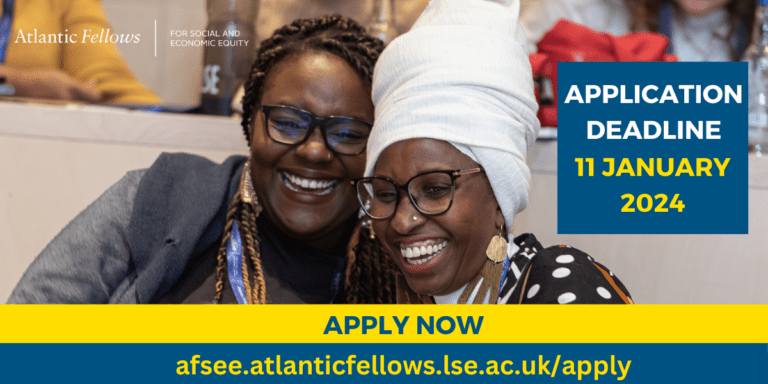Deadline: 11 January 2024
Are you a change agent committed to fighting inequality? Do you want to learn from academics, innovators, activists and social change organisations, as well as the latest academic research and expert insights on inequalities? Are you ready to join forces with a lifelong community of people working to build a fairer world?
Atlantic Fellows for Social and Economic Equity (AFSEE)based at the London School of Economics and Political Science, is a innovative, fully-funded scholarship which brings together policymakers, activists, practitioners, artists and researchers from around the world to explore and challenge the root causes of inequality. The programme is aimed at mid-career social change leaders from diverse countries and backgrounds who work to challenge inequality and who believe that inequality can be defeated.
Programme details
The AFSEE programme has two different modalities: Residential and Non-Residential. Residential fellows undertake the MA in Inequalities and Social Sciences at the LSE and take part in the programme's personalised modules throughout the year. Non-Residential course members, who remain in their home countries and work contexts during the active fellowship year, undertake practice-based project work and travel to join their Residential counterparts on fellowship modules. Non-residential fellows will be awarded a Postgraduate Certificate in Social and Economic Equity upon successful completion of the active fellowship year.
After completing the year of active scholarship, the scholarship holders from both programmes join a lifetime scholarship community made up of members from all seven Atlantic Fellows programmes around the world and receive ongoing support to learn, connect and collaborate.
Tracks
The scholarship programme offers two options: Residential and Non-Residential. Participants in both courses take part in rigorous academic courses, leadership and skills development and practical approaches to promoting social change.
- Residential course Residential Scholars undertake a one-year full-time Master's degree in Inequalities and Social Sciences at the LSE, as well as taking part in personalised AFSEE Modules. This is why the Residential programme is only suitable for people who can dedicate themselves to full-time study for a full academic year. Residential scholars are required to move to London for the duration of their Masters programme. For the 2024-25 cohort, Residential Fellows are expected to reside in London from September 2024.
- Non-residential course Non-residential fellows have a unique opportunity to investigate inequalities over a 12-month period through a set of distinctive and comprehensive AFSEE modules and practice-based project work. After successfully completing the active fellowship year, they receive a Postgraduate Certificate in Social and Economic Equity.
Non-residential fellows remain in their home and professional environments and travel to take part in the face-to-face Modules. Due to the reduced time and location commitment, this scholarship programme is ideal for candidates who cannot take a full year off work. However, they are expected to dedicate time (around five hours a week), in addition to their Module commitments, to reading, coursework and project work.
Support and Funding
Residential Scholars
- The Residential track of the programme includes integrated tuition fees for the MSc in Inequalities and Social Sciences course; travel to and from London at the beginning and end of the active scholarship year; and any costs related to visas and immigration. All Principal Fellows were also awarded a grant of £23,000 to cover living costs while in London.
- AFSEE also has a number of additional avenues of support and funding to ensure that there are no barriers to scholars participating fully in the programme. Such as access to LSE's Disability and Wellbeing Service team and opportunities to apply to AFSEE's Family Care Support Fund and Resilience Support Fund.
- Presidential Scholars receive support from a dedicated LSE academic mentor, the AFSEE academic leader through monthly meetings and regular check-ins, and through other engagement opportunities offered throughout the year.
Non-Residential Scholars
- The AFSEE programme covers the cost of the Postgraduate Certificate; all travel-related expenses to and from modules; accommodation and related costs during modules; and any visa fees. All non-resident fellows have also signed up for a grant of up to £10,000 to support the implementation of their fellowship project.
- AFSEE also has several avenues of additional support and funding to ensure that there are no barriers to scholars participating fully in the programme. Such as opportunities to enrol in the AFSEE Connectivity Fund, Family Assistance Support Fund and Resilience Support Fund.
- Each non-residential scholar receives support from a dedicated mentor who has been selected for their knowledge and experience in the scholar's area of focus.
Eligibility
Residential Scholars
- Candidates must have at least 7 years of experience in the real world in the fight against inequalities.
- Applicants must qualify for admission to the LSE Master's in Inequalities and Social Sciences. These requirements include an undergraduate degree (equivalent to a 2:1 or above) in any discipline. A background in social sciences and/or work experience in the field of social policy are advantageous but not essential.
- Applicants must fulfil the LSE's standard English language requirements.
Non-residential scholars:
- Candidates must have at least 7 years of experience in the real world in the fight against inequalities.
- Candidates must have a degree (equivalent to 2:2 or higher) in any discipline. However, we want to be inclusive and encourage applications from non-traditional candidates and are therefore open to applications from candidates who do not have a degree.
- Applicants must fulfil the LSE's standard English language requirements.
Application
All applications for the Atlantic Fellows for Social and Economic Equity programme must be submitted online via the LSE Postgraduate Admissions Portal. Applications are open from Thursday 12 October 2023 until Thursday 11 January 2024. Please note that all the required supporting documents must be submitted with your application, so it is recommended that you start the application process as early as possible.
For more information, visit AFSEE .


